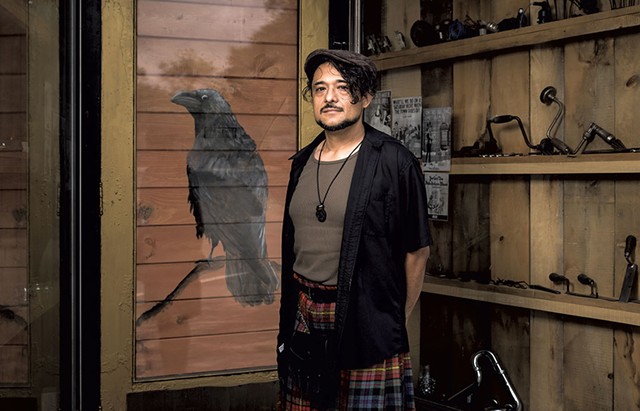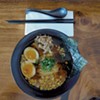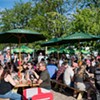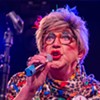click to enlarge 
A sign posted outside CrowBar Hardware Store in Claremont, N.H., advises that the establishment is closed due to violations of the National Prohibition Act. Indeed, the door is locked. But ringing a hidden bell grants patrons entrance into the speakeasy-style bar and restaurant, where vintage furniture and old-timey jazz hark back to the days of flappers and Al Capone.
Throughout the dimly lit room, diners sip cocktails and eat elevated pub grub in pairs or trios. But in one corner of the restaurant, seated in a circle of wingback chairs, is a small, inclusive gathering. They're not bootleggers or gangsters but members of a different kind of hip group: Qbar Upper Valley.
Organized by San Francisco transplant Aaron Almanza, Qbar is a guerilla-style pop-up social club meant to bring together the Upper Valley's scattered LGBTQ community. The group gathers monthly, descending upon a different bar in the region announced that day via Instagram. Neither followers nor the bars know in advance where the meetups will take place, which is part of the fun. It's also, Almanza noted, a sad necessity.
"The unfortunate reality is, there are hate groups out there," Almanza said in an interview at the June Qbar meetup at CrowBar. "We don't want to give those who would want to give us a hard time time to plan something."
Qbar Upper Valley was inspired by Guerrilla Queer Bar, an event that started in San Francisco around the turn of the 21st century. According to its dot-com-bubble-era website, well preserved by internet archive site Wayback Machine, its purpose was to get the queer community out of the stereotypical gay bars in the Castro District and "colonize" the diversity of straight bars across the city. In those days — dark or golden, depending on your feelings about social media — revelers could learn the location of that night's bar through an email newsletter or by calling a hotline to receive "up to the minute party info."
Guerilla Queer Bar organizers reportedly never made money off their venture. Some of its founders came from the South and particularly hoped the movement would take off in rural areas — they even provided a 23-page manual for folks to start their own events in other cities and towns. Though the original San Francisco Guerilla Queer Bar movement seems to have faded by 2003, its legacy lives on through efforts like Qbar, Guerilla Queer Bar Burlington and others all over the country. And this time, organizers have Instagram.
Almanza, who is the executive director of LGBT National Help Center, moved to Claremont from San Francisco in January 2022. He'd previously lived in the Upper Valley about 20 years ago as a park ranger at Saint-Gaudens National Historical Park in Cornish, N.H., and has returned to the region for vacations.
"It's beautiful," he said. "I am a history nerd. This area is steeped in history, and I love finding out about it."
In particular, he shared that there's a significant history of queer spaces in Vermont. In the early days of the gay liberation movement, the Andrews Inn in Bellows Falls was a haven for queer folks in the region in the 1970s and '80s. Queer people came from Montréal, Boston and New York to spend time at the hotel, disco, co-counseling center and community space.
Upon moving back to Claremont, Almanza discovered that there were a lot of queer events in Vermont. But he found himself having to travel to Montpelier and Burlington because there wasn't much happening in the Upper Valley.
Part of the challenge is geography. The Upper Valley sits smack-dab between hubs such as Burlington and Montpelier in Vermont and the Concord/Manchester area in New Hampshire. It's not particularly far from either, but it's also not especially close.
As a result, Almanza said, "We're kinda forgotten about when it comes to queer events."
In April, he attended a drag event at the Main Street Museum in White River Junction. There, he conspired with two friends to start up a Guerilla Queer Bar-style series closer to home. Qbar Upper Valley was born because, as Almanza put it, "You can't always wait around for somebody else to do it."
The first Qbar event was held in May at the Filling Station Bar & Grill in White River Junction. Almanza wasn't sure whether Instagram "likes" would translate into attendees, but he estimates that about 30 or so people showed up.
"It was great," he said. "I can say we definitely took over the bar. The bartender loved us."
Although bars might not know Qbar is coming, Almanza said he wants the group to be welcomed. "We consider ourselves unexpected guests," he said. "Our rules are: Be polite, be patient and tip well."
Heath Lisle helped devise the idea with Almanza at the Main Street Museum drag night and has attended Guerilla Queer Bar-style events in Boston and Colorado. While online outlets can help foster connections, Lisle said there's no substitute for meeting in person.
"I think the biggest thing is community," Lisle said of LGBTQ folks. "We've been through a time where there's so much more visibility, but it's in some ways just as needed to connect with people that you have shared experiences [with]."
Whitney Skillen attended the June Qbar event. Other places she's lived have had tighter queer communities, she said, adding, "I've never lived in a place as small as Claremont."
Originally from North Carolina, Skillen met her wife in New York City's vibrant queer scene. They moved to New Hampshire in 2021.
"This is the first time we've lived in a place that's super rural," she said. She thinks the problem is not that the Upper Valley's queer community is small but that it's disconnected.
"There's very few places for us to gather and feel like we can be safe," she said. "But we're trying to change that."
The CrowBar pop-up attracted about 15 people, a respectable showing for a Tuesday after nearly a month of Pride events. As Almanza said, "We're not taking up that much room, but we are still creating space."
Skillen hopes that Qbar events will inspire someone to open a queer bar in the Upper Valley.
"It's like the reverse of 'If we build it, they will come,'" she said. "If we start showing up, someone's going to realize they need to build it."



















































